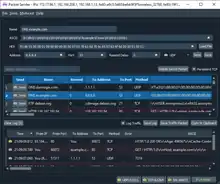 | |
 Packet Sender GUI | |
| Original author(s) | Dan Nagle |
|---|---|
| Stable release | v8.3.5
/ March 19, 2023 |
| Written in | C++ |
| Operating system | Cross-platform |
| Type | Packet generator |
| License | GPL v2 |
| Website | packetsender |
Packet Sender is an open source utility to allow sending and receiving TCP and UDP packets. It also supports TCP connections using SSL, intense traffic generation, HTTP(S) GET/POST requests, and panel generation. It is available for Windows, Mac, and Linux. It is licensed GNU General Public License v2 and is free software.[1] Packet Sender's web site says "It's designed to be very easy to use while still providing enough features for power users to do what they need.".[2]
Uses
Typical applications of Packet Sender include:
- Troubleshooting network devices that use network servers (send a packet and then analyze the response)
- Troubleshooting network devices that use network clients (devices that "phone home" via UDP, TCP, or SSL—Packet Sender can capture these requests)
- Testing and development of new network protocols (send a packet, see if device behaves appropriately)
- Reverse-engineering network protocols for security analysis (such as malware)
- Troubleshooting secure connections (using the SSL server and client).
- Automation (via Packet Sender's command line interface or resend feature)
- Stress-testing a device (using intense network generator tool)
- Sharing/Saving/Collaboration using the Packet Sender Cloud service
Packet Sender comes with a built-in TCP, UDP, and SSL server on multiple ports a user specifies. This remains running listening for packets while sending other packets.
Features
As of version v8.1.1 Packet Sender supports the following features:[3]
- Live traffic log (Time / From IP / From Port / To IP / Method / Error / ASCII / HEX)
- Persistent TCP and SSL Connections
- HTTP Requests with Auth headers
- Portable Mode
- IPv6 Client / Server
- IPv4 Subnet Calculator
- Saved packets (with sending directly from saved list)
- Mixed ASCII packet notation (ASCII with embedded syntax to allow hex)
- Multiple TCP servers
- Multiple UDP servers
- Multiple SSL servers
- Multicast send and receive
- Packet resending at n intervals (where n is seconds)
- Multi-threaded TCP/SSL connections
- Command-line interface
- Packet responses
- Smart Packet responses
- Macros inside packet responses for TIME, DATE, UNIXTIME, RANDOM, UNIQUE
- Packet search (for saved packets)
- Packet export/import
- Intense Traffic Generator (UDP Flooding) via GUI or CLI
- Quick-send from traffic log
- Save traffic log
- Panel Generation for scripting buttons
- Packet Sender Cloud
Platforms
- Windows (64-bit)
- OS X (Intel-based x86-64 or M1 Macs with Rosetta 2)
- Linux (Source Distribution with Qt or x86-64 AppImage or Snap)
Packet Sender Mobile is available on iOS. It only has the core features of desktop Packet Sender (send, receive, TCP, UDP, and Cloud).
See also
References
- ↑ "Packet Sender License". Retrieved 15 February 2015.
- ↑ "Packet Sender Main Site". Retrieved 22 February 2014.
- ↑ "Packet Sender Documentation". Retrieved 4 March 2022.